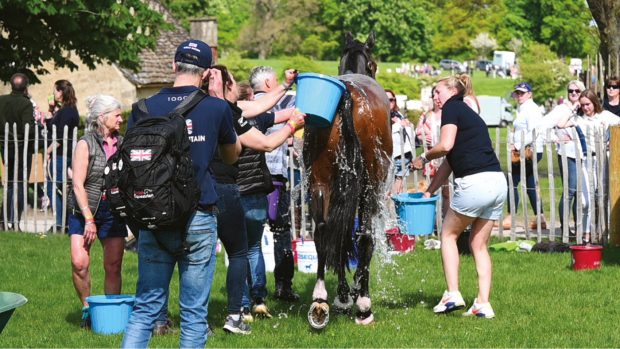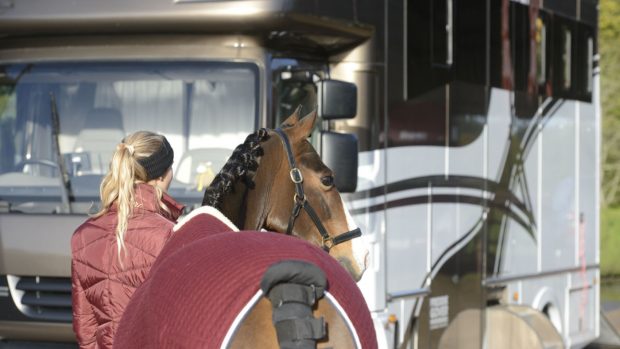The NAF Grooms’ Award, presented at the European Dressage Championships last week, was the latest in a series of new incentives being offered to grooms at top-class competitions.
The award was a great encouragement for the winner, Swedish Emma Stenman, who has been working as a groom for less than a year.
“I was very surprised to win, there are so many good grooms here,” said Emma. “I just try to do a good job and put the horses first.”
Judged by Jane Bredin and assessed on turnout, upkeep of the stable area and general working manner, the prize consisted of £100 and a commemorative jacket, bearing the legend “Elite Groom of the Show, EDC, 2003”.
“Something like this really helps to inspire the grooms. The money is also really good to have — I’ve lost my mobile phone while I’ve been in England, so I may have to use it to buy a new one,” added Emma.
The trip also proved a success for Emma’s boss, rider Jan Brink, who clinched individual European silver and Open European bronze medals with Bjorsells Briar.
NAF’s support of grooms at the event included a large donation to improve working conditions at the show — going towards catering, showers and social facilities — and kit bags for all grooms who took part.
“The kit bags went down a storm,” said NAF spokesperson Tracy Lloyd. “Nothing like this has been done at a show in the UK before and we had a fantastic response.”
The introduction of a grooms’ co-ordinator for the championships — a role filled by former elite groom Lucy Katan — also proved a great success.
Chantalle Boogaarts, groom for Dutch competitor Ellen Bontje, said: “It’s been so much better having a grooms’ co-ordinator. If things aren’t right, then there’s someone you can turn to and work together to improve them. It makes you feel appreciated.”
New BEVA courses for autumn
The British Equine Veterinary Association has arranged two courses for the autumn, aimed directly at lay people working in the equine arena.
The Advanced course for Equine Dental Technicians, taking place on 27-28 September in Birmingham, is designed for more experienced EDTs who wish to sit the BEVA/BVDA examination. It is a theory-based course, which is a prerequisite for the exam. Delegates must submit a CV and two veterinary references in order to be eligible to attend the course.
Lectures will take place on advanced dental anatomy, equine nutrition, dental disorders and treatments, microbiology, disinfection, health and safety and current EDT-relevant UK legislation. There will also be a section entitled “guidelines for the forthcoming examination”, which will cover routine rasping of equine teeth and creation of bit seats in the British context, as well as reasons for the failure of past examinations.
The course costs £290 for two days and speakers will include Professor Paddy Dixon, Ian Dacre, Henry Tremaine, Malcolm Morley, Graham Duncanson, and EDTs Mat Carter and Martin Walls.
The second course run by BEVA, AI for Technicians, will be taking place on 13-14 November in Tetbury, Gloucestershire. As artificial insemination is currently being deregulated — at present it can only be carried out by veterinary surgeons — DEFRA have agreed that approved training courses for AI Technicians may take place.
In order to ensure both the welfare of the horse and the successful development of equine AI in the UK, BEVA are running an annual, DEFRA-approved training course, designed to ensure that personnel involved in the AI process are suitably trained and certified.
Subjects covered in this two-day course will include “The Stallion” and the anatomy and physiology of the reproductive system, types of breeding, semen collection, handling and evaluating, semen cooling and the insemination dose.
“The Mare” will also be covered, including the oestrous cycle, follicle development, advantages and disadvantages of AI and pregnancy diagnosis. There will also be a general section covering the legal position of the RCVS with respect to equine AI and health precautions and the equine viral arteritis.
The course is primarily aimed at people actively involved in equine AI. Speakers for this course will include Dr Juan Samper, Dr Jonathan Pycock, Martin Boyle and Christopher Shepherd. The cost for the two days is £400.
An application form for both courses can be obtained from the BEVA office (tel:01223 836 970 or email: info@beva.org.uk.) Please note a veterinary signature is required for both courses.




